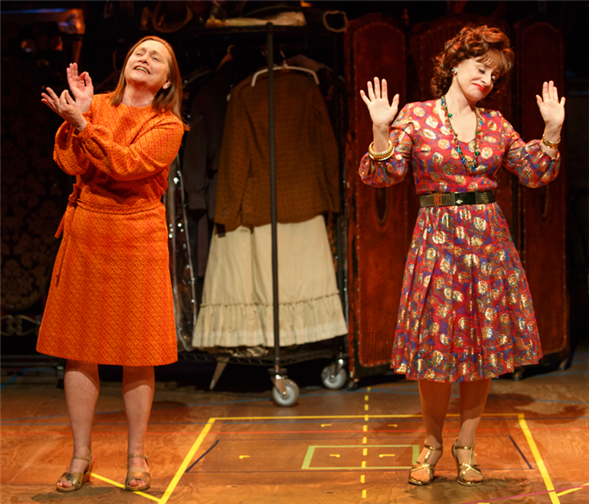Why Dale Soules understands her character in Shows for Days
---
There's a moment in
Shows For Days, now playing at Lincoln Center Theater, when a character named Sid annihilates her pride. To save her theatre company, she must ask for help from the woman who broke her heart.
And even though Douglas Carter Beane's autobiographical play – which follows the real-life drama of an amateur troupe in 1970s Pennsylvania – is a comedy, the scene carries serious weight. After all, the Prometheus Theatre, which is inspired by the real-life Genesius Theatre in Reading, is vitally important to Sid, a blue-collar lesbian who does everything from repair sets to play Nana the dog in
Peter Pan. It means just as much to the rest of her theatre family, including Car (Michael Urie), a wide-eyed teenager based on Beane himself, and Irene (Patti LuPone), a rich man's wife who fears she has squandered her life.
So when Sid has to consider debasing herself in order to keep Prometheus going, we know exactly what's at stake.
"That's where she can have feelings that are safe," says Dale Soules, who plays the character with a mixture of no-nonsense gruffness and mother-hen concern. "It comes down to, 'Well, which of these things is more important to you? Your own heartbreak or the continuance of this theatre?' And so the choice is made. 'The heartbreak isn't gonna get me anywhere, and this theatre gives real meaning to my life. So horrible as it is, I'm gonna do it.'"
For Soules, whose extensive career includes everything from Broadway musicals like
The Magic Show and
Grey Gardens to the TV series
Orange is the New Black, that attitude rings absolutely true. When asked if she understands Sid's willingness to put herself on the line for Prometheus, she responds with the following story, which exemplifies how the theatre can change someone.
"This is a part of their lives that's fulfilling, that has excitement, that has acceptance," Soules says. "Whether you're black or gay or underage, you're accepted there. And that really speaks to me very strongly because the theatre really did save my life, without a doubt.
"Well, the woods and the theatre, but we're not talking about the woods.
"It was that acceptance in the face of my own sexual confusion at the time. And in the face of people's judgment of my economic situation, which was not good. I grew up in a house with no running water. And big deal. It wasn't a big deal to us. We carried water from the brook that ran by the side of the house [in Greenwood Lake, New Jersey]. But I was judged to be dirty. People literally moved away from me.
{Image1}
"And then I had a teacher in my junior high school, who through some writing I had done decided he was going to tell me the story of three plays. He told me the story of
Oklahoma!, the story of
Brigadoon, and the story of
Riders to the Sea.
"And he said, 'Which story did you like best?' And I said, 'Oh, I liked
Oklahoma! And he said, 'Which character did you like best?' And I said, 'Oh, I liked Aunt Eller.' And he said, 'Why Aunt Eller?!?' I said, 'Well, because she was the peacemaker. Without her, everybody would've killed each other at the hoedown and the play wouldn't have gone on.' And he said, 'Well, I'm gonna try to convince the music teacher to do a production of
Oklahoma!, and if I can, you're gonna be Aunt Eller.'
"And he did. And what happened in that production really changed my life. As Car says, 'This is the moment. This is where I realized that I had a place in the world.' Because I saw the kids that I was working with – many of them who were in the in-crowd and who walked past me with their noses high in the air – really change.
"Suddenly they were not only treating
me differently, they were also treating each other differently. Because the criteria had changed from 'Who saved who a seat in the lunch room' or 'How many dates did you have to turn down for the prom?' or "How much did you dad make or your mother make or what kind of house did you live in?'
"Now, the criteria was, 'What could you contribute to this cooperative effort?' And I saw it change mean-spirited, prejudicial people into cooperative human beings. And that is what made me want to be in the theatre. So when I think about what Sid does, I understand it. Of course I do."
---
Mark Blankenship is the editor of TDF Stages
Photos by Joan Marcus. Top photo: Dale Soules (left) and Patti LuPone
